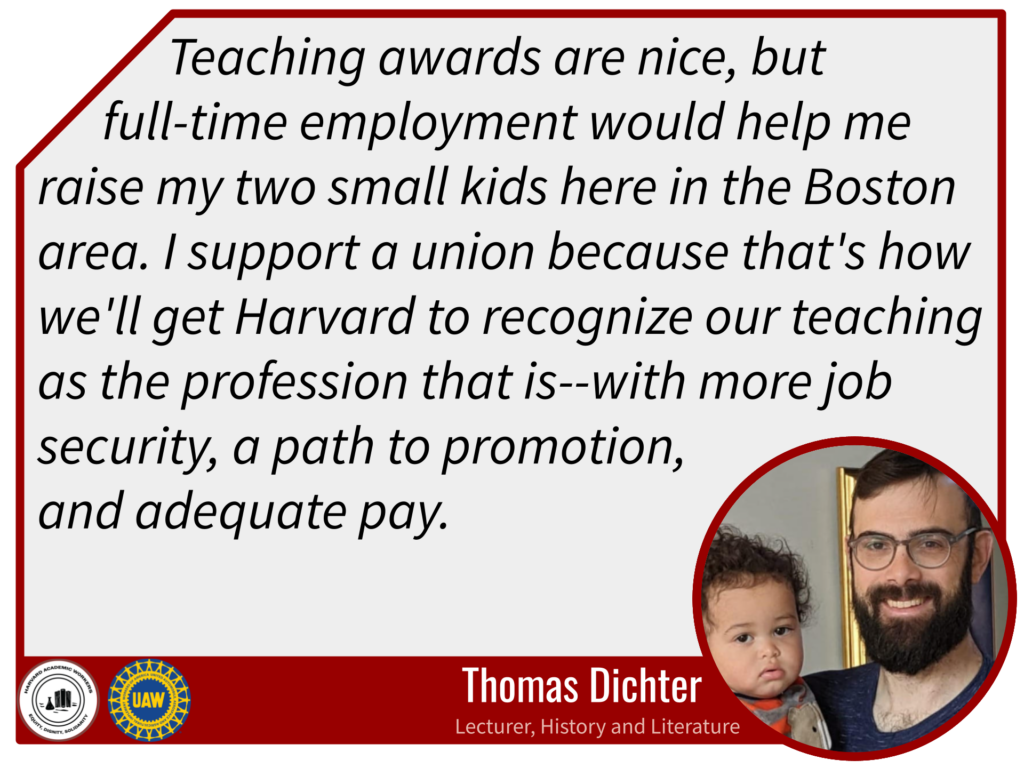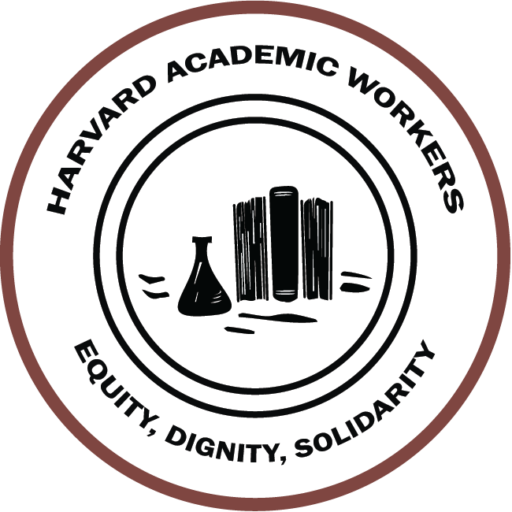Join Harvard Academic Workers UAW Today!
EQUITY, DIGNITY, SOLIDARITY
After more than a year of organizing, on March 5th we filed for our union election! With this announcement, we have shown that our campaign has support from a large majority of academic workers performing teaching and research in the Faculty of Arts and Sciences (FAS), the Harvard Medical School (HMS), the Harvard Divinity School (HDS), and the clinical programs of the Harvard Law School (HLS). After extensive discussions, we came to an agreement with Harvard administrators to hold the election on April 3rd and 4th, from 10 AM to 12 PM and 2 PM to 6 PM both days (HLS on April 3 alone). (There is a Button above for election details).
Now, together we get to make a decision: do we want to allow things to continue the way they have, or do we want a seat at the table to bargain for improvements with the administration?
Overwhelmingly, academic workers have made their voices heard: YES, WE WANT A UNION!
Wages that keep up with the cost of living in one of the most expensive region in the country
Wages for many academic workers have failed to keep up with the rising costs of living. With a union, we will be able to sit down with the administration to bargain for raises that meet the costs here in Boston, and for consistent raises as costs continue to rise.
- At other universities, workers have been able to win significant improvements to their wages. Barnard contingent faculty bargained for 16% raises in their first year of their contract.
- Postdocs at Columbia won 14.5% raises in their first year of their first contract, and 24% in increases over the three years of their current contract.
- Mt Sinai postdocs won raises to make them the highest paid postdocs in the country, starting at $72K and earning $80K at the 4th year of employment!
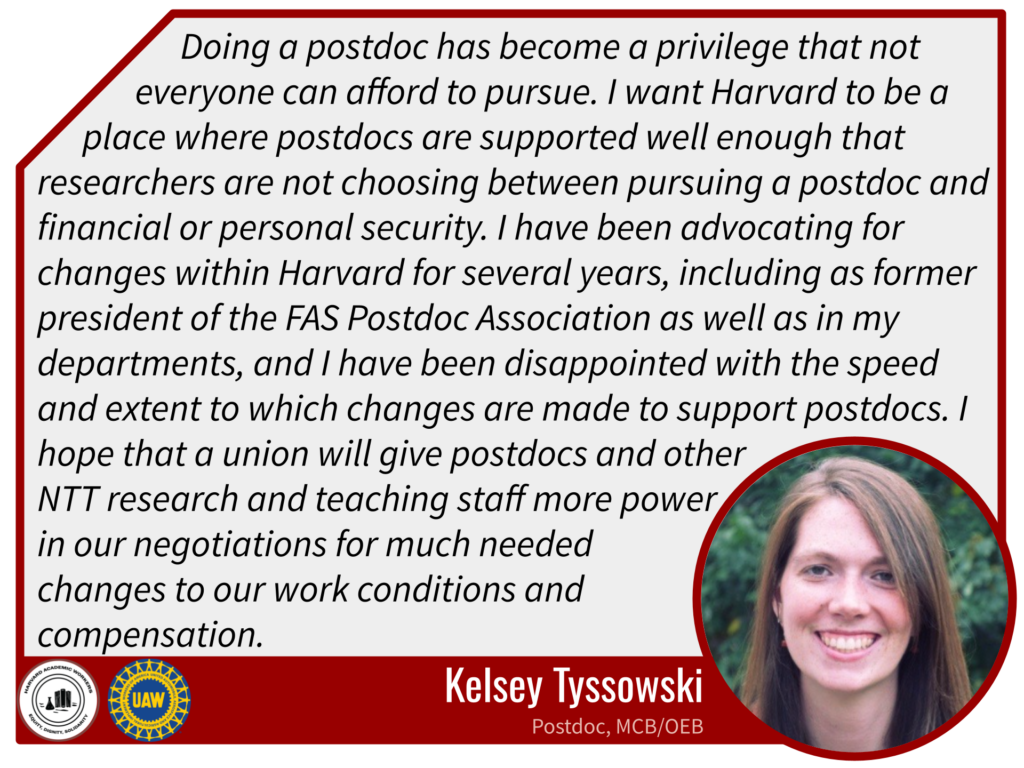
Fighting against time caps and earning the job security we deserve!

Many non-tenure-track (NTT) teaching and research positions are subject to “time caps”—arbitrary limits imposed by the Harvard administration on the maximum term of employment. Workers in these positions “time out” of employment after a fixed number of years. With a union, we have the power to negotiate new contract terms and reappointment procedures to improve our job security and reduce turnover, thus supporting and cultivating the valuable experience and expertise that we bring to the university.
The specifics of these policies vary across Harvard, but the problem is pervasive. Within the Faculty of Arts and Sciences (FAS), College Fellows, Lecturers, and Preceptors each time out after 2, 3, and 8 years, respectively. NTT teachers may not hold any combination of appointments in those positions for more than 8 years, “regardless of how many or what type of appointments (including teaching assistantships and tenure-track faculty appointments) the individual has held in the past.” Time caps deny us the opportunity for stable, long term employment. Time caps also disrupt the education of our students by increasing instability and churn. Students cannot depend on consistent relationships with teachers, mentors and research partners, disrupting the quality of their education.
With a union, we can negotiate with Harvard over reappointment procedures and move away from the arbitrary and disruptive limits that time caps impose. Not all NTT positions have time caps—even here at Harvard. Lectureships in the Faculty of Medicine and the T.H. Chan School of Public Health, for instance, may be renewed indefinitely, a model that could be extended to every Harvard school.
Other unions that represent NTT teachers and scholars have won fair reappointment procedures. Some recent union wins related to Time Caps and Reappointment Procedures:
- Secured contractual right to presumptive renewal with no arbitrary time limit, delineation of accrual of seniority for NTT faculty, and increased compensation [bargained for by NTT faculty at the University of Michigan (LEO-AFT MI Local 2644).
- Presumption of reappointment within contracts for salaried lecturers, conditional on a bargained-for process of performance review [bargained for by lecturers at Boston University (SEIU 509)].
- Contractual presumptive renewal as part of a landmark framework agreement in alliance with grad workers and tenured faculty (bargained for by NTT faculty at Rutgers).
Better protections from bullying, harassment and discrimination
Protection from harm is one of the five essentials for workplace mental health and well-being outlined by the U.S. Surgeon General. This requires active enforcement through accountability. Unions like HAW-UAW can act as agents of protection and advocacy for its members by holding institutions responsible to existing policies and demanding necessary change to increase safeguards for academic workers.
Collective bargaining through unionization can tackle more systemic issues like bullying and harassment. Recent reports show that academic harassment and bullying is still all too common, including internal surveys at Harvard. In 2022 the Faculty of Arts and Sciences (FAS) Postdoc Survey found 11% of FAS postdocs experienced bullying within the last year, with some departments reporting rates as high as 25%. In a 2020 climate survey from FAS, 22% of non-tenure track faculty reported experiencing bullying and 60% reported experiencing incivility. Even when supported by internally generated data, the university has taken no concrete steps toward remedying this pervasive problem. By building power through HAW-UAW, we can hold the university to account and help ensure the university protects all its affiliates from harm, regardless of title.
- Established industry-setting protections against abusive conduct and bullying (UC-UAW)
- Forced their institution to create a committee with an enforceable timeline for the development of university-wide policy to address bullying (CPW-UAW)
- Increased protections around the process for discrimination and harassment issues including access to neutral third-party arbitration (negotiated by University of Washington Academic Student Employees and Postdoc Union (UAW-4121)
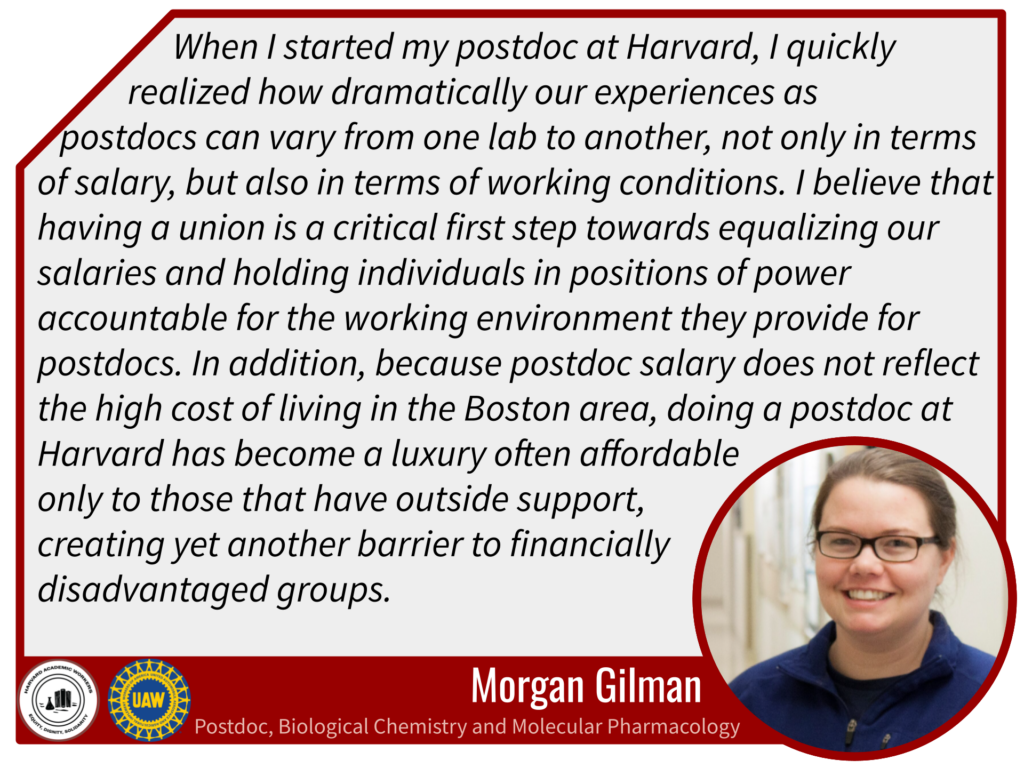
Protections and support for international scholars
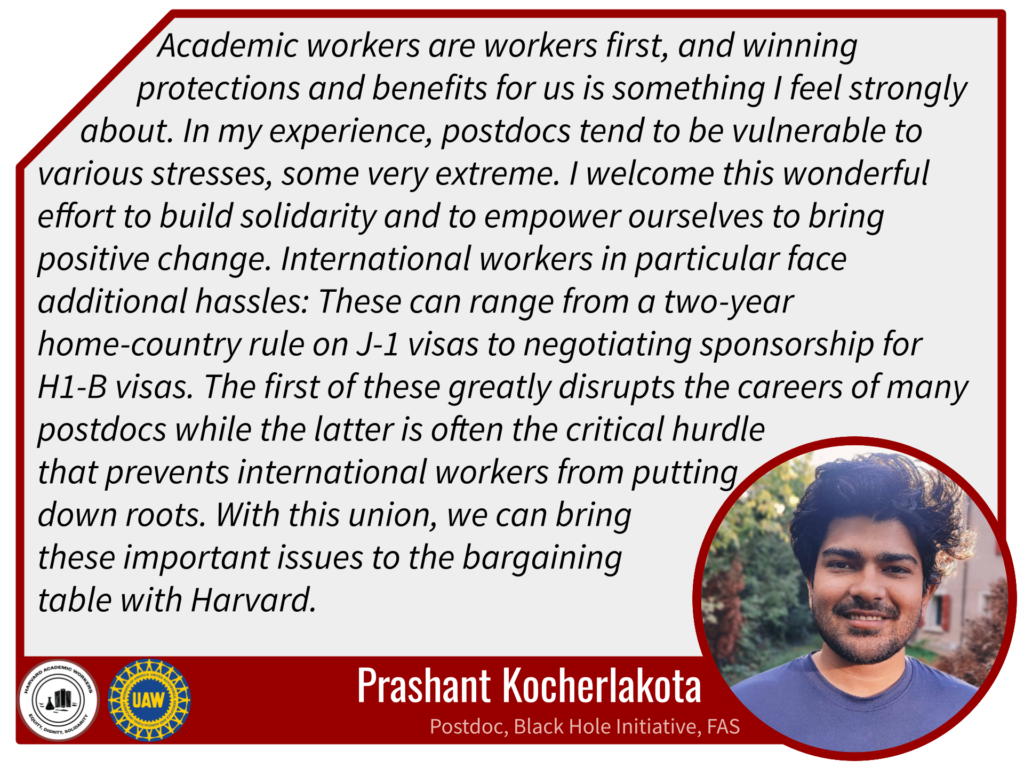
International scholars and workers are an integral part of Harvard, but we face additional challenges and burdens stemming from our standing as visa-holders. For many of us, our legal status in the country is directly tied to our status as a Harvard employee.
International workers have the same rights to support and join unions as domestic workers. See https://harvardacademicworkers.org/faqenglish/
In addition, recent literature shows that academic harassment and bullying is a particular problem for international workers and others in marginalized positions. Threats to visa status can and are used to coerce international workers into working overtime and/or doing work outside their official responsibilities.
By building power through HAW-UAW, international workers can hold the university to account and help ensure the university protects all its affiliates from harm, regardless of citizenship status.
A 2020 survey in Harvard’s Division of Science had approximately half of the 1,200+ respondents report not holding citizenship status. Late contracts, unofficial appointment letters, and canceled classes have disproportionate and severe consequences for workers with insecure residency status. Short term contracts make international workers vulnerable to deportation. Technicalities make visa holders ineligible for benefits, such as childcare subsidies, that are made available to domestic workers doing the same work. Visa holders are additionally responsible for the financial burden of maintaining visa status. Unions like HAW-UAW can fight to ensure institutions regularize policies and contracts to address these vulnerabilities.
Recent Union Wins Related to Visa and Immigration Issues
- Established funds to help defray costs associated with immigration and maintenance of legal working status (negotiated by the Harvard Graduate Students Union, HGSU-UAW, in 2022)
- Increasing initial appointment minimums from one year to two years (negotiated by the University of California Postdoc Union, UAW 5810)
- Guaranteed leave time for immigration appointments and protections should immigration laws change, UAW 5810)
- Increased offer windows to accommodate work authorization timelines (negotiated by the Columbia Postdoc Union , CPW-UAW)
- Visa fee reimbursement fund established to defray costs associated with immigration (negotiated by UMass Amherst Postdoc Union, PRO-UAW)
Making Harvard more family friendly for academic workers
Massachusetts has one of the highest costs of childcare in the nation. The median annual cost of full-time care for one infant in Middlesex and Norfolk Counties is $26,409 (childcare centers on the Harvard campus charge as much as $42,720). Recognizing these costs, the university rightly offers ample support for its tenure-track (TT) faculty and upper-level administrators, who are offered generous childcare subsidies for household incomes up to $250,000. Yet it provides far less support to non-tenure-track (NTT) faculty. A NTT faculty household earning $150,000 will receive no childcare assistance under current programs, while a TT faculty household earning the same income receives $12,000.
Harvard has a responsibility to support all parents who provide labor to the University. Workers in other academic unions, such as Columbia University’s CPW-UAW 4100, University of California’s UAW-5810, and Harvard’s own Graduate Student Union (HGSU-UAW 5118) have been able to win substantial improvements in parental leave and childcare assistance. With a seat at the table, we can fight to close the equity gap between TT and NTT faculty, seeking much-needed support to helpHarvard’s academic worker parents care for their families while they carry out the University’s core academic functions.
